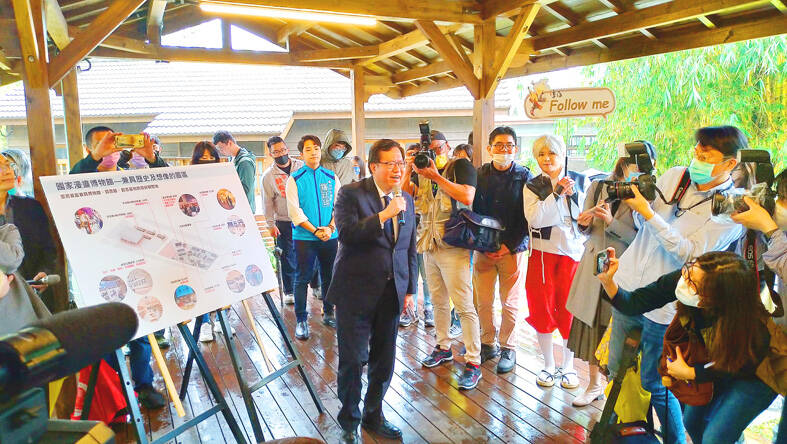A cultural park on the site of the former Taichung Prison is to be transformed into a national comics museum, and is scheduled to open by the end of the year, Vice Premier Cheng Wen-tsan (鄭文燦) said on Saturday.
Minister of Culture Shih Che (史哲) delivered a report on the comics museum in his first Cabinet meeting after taking office on Jan. 31, Cheng said.
After years of discussion, the Natural Way Six Arts Cultural Center was chosen as the site of the planned museum, he added.

Photo: CNA
The complex houses a gym that dates back to 1937 and was used by prison officers to practice judo and kendo during the Japanese colonial era.
In 1945, when the Chinese Nationalist Party (KMT) government took over the facility from the Japanese government, it was repurposed as Taichung Prison.
The Ministry of Culture in 2020 announced that it had selected the Empire Sugar Factory, another historic site dating back to the Japanese colonial era, as a site for the museum.
However, that plan was eventually shelved due to disputes over land ownership.
Calling comic books by local artists “part of Taiwan’s collective memory,” Cheng said the Cabinet would give the museum its full support by allocating sufficient funds for its planning and construction.
The Ministry of Culture should plan the museum to be easily accessible, allowing people to experience the magic of Taiwanese comics and giving Taichung a new cultural landmark, Cheng said.
The plan to establish the museum was unveiled in 2017 by then-Taichung mayor Lin Chia-lung (林佳龍), with the objective to showcase the works of Taiwanese manga artists and to make Taichung a hub for the local comics industry.
The Ministry of Culture plans to open the museum and start holding exhibitions by the end of this year in light of popular demand, Shih said.
The museum and its surrounding area would occupy more than 2 hectares, including the plot where the former prison dormitories are, he said.
Contrary to traditional designs, the museum would not be one building, but would comprise 19 Japanese buildings and one planned building, he said.
The museum complex would serve as a venue for comic creation, markets, research, archives and exhibitions, he said.

Taiwan has received more than US$70 million in royalties as of the end of last year from developing the F-16V jet as countries worldwide purchase or upgrade to this popular model, government and military officials said on Saturday. Taiwan funded the development of the F-16V jet and ended up the sole investor as other countries withdrew from the program. Now the F-16V is increasingly popular and countries must pay Taiwan a percentage in royalties when they purchase new F-16V aircraft or upgrade older F-16 models. The next five years are expected to be the peak for these royalties, with Taiwan potentially earning

STAY IN YOUR LANE: As the US and Israel attack Iran, the ministry has warned China not to overstep by including Taiwanese citizens in its evacuation orders The Ministry of Foreign Affairs (MOFA) yesterday rebuked a statement by China’s embassy in Israel that it would evacuate Taiwanese holders of Chinese travel documents from Israel amid the latter’s escalating conflict with Iran. Tensions have risen across the Middle East in the wake of US and Israeli airstrikes on Iran beginning Saturday. China subsequently issued an evacuation notice for its citizens. In a news release, the Chinese embassy in Israel said holders of “Taiwan compatriot permits (台胞證)” issued to Taiwanese nationals by Chinese authorities for travel to China — could register for evacuation to Egypt. In Taipei, the ministry yesterday said Taiwan

Taiwan is awaiting official notification from the US regarding the status of the Agreement on Reciprocal Trade (ART) after the US Supreme Court ruled US President Donald Trump's global tariffs unconstitutional. Speaking to reporters before a legislative hearing today, Premier Cho Jung-tai (卓榮泰) said that Taiwan's negotiation team remains focused on ensuring that the bilateral trade deal remains intact despite the legal challenge to Trump's tariff policy. "The US has pledged to notify its trade partners once the subsequent administrative and legal processes are finalized, and that certainly includes Taiwan," Cho said when asked about opposition parties’ doubts that the ART was

If China chose to invade Taiwan tomorrow, it would only have to sever three undersea fiber-optic cable clusters to cause a data blackout, Jason Hsu (許毓仁), a senior fellow at the Hudson Institute and former Chinese Nationalist Party (KMT) legislator, told a US security panel yesterday. In a Taiwan contingency, cable disruption would be one of the earliest preinvasion actions and the signal that escalation had begun, he said, adding that Taiwan’s current cable repair capabilities are insufficient. The US-China Economic and Security Review Commission (USCC) yesterday held a hearing on US-China Competition Under the Sea, with Hsu speaking on